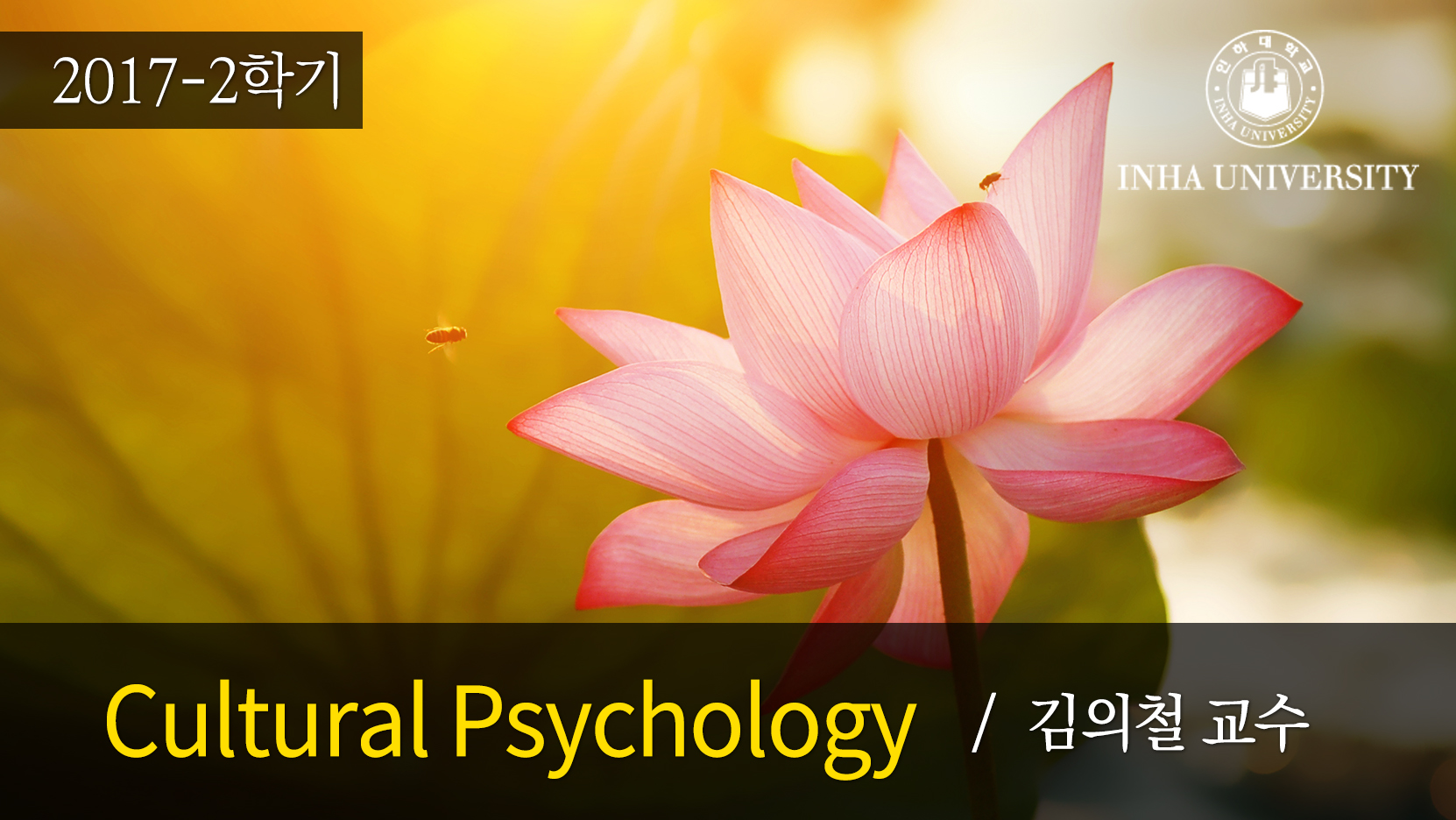
Cultural Psychology
INHAuniversityK
Course introduction(강의소개)
The goal of this course is to cover the current theories, concepts and advances in cultural psychology.
This course will examine the theoretical and scientific foundation of cultural psychology by providing the scientific foundation of modern psychology articulated by Wilhelm Wundt, the father of modern psychology. It will outline the development of cultural psychology by reviewing the physical, biological and cultural sciences traditions.
The course will also examine the influence of ecology and cultural adaptation of subsistent economies (hunting and gathering societies and agricultural societies), cultural change and transformation (renaissance, industrialization and modernization).
This course will be provide the definition of culture and cultural differences. It will examine the influences of religion and philosophy from Western and Eastern perspectives.
This course will examine substantive areas of cultural psychology: 1) the religious and philosophical influences and indigenous Korean concepts (jung, chemyon, han), 2) substantive areas in psychology (parent-child relationship, conception of self, child development and social behavior, and 3) application of cultural psychology in the areas of educational achievement, stress, health and quality of life, organizational behavior, leadership, and economic development and political behavior, human rights, democracy, and social capital.
The course will emphasize the importance of understanding human creativity and innovations that have transformed our lives and our understanding of ourselves and our culture.
Instructional Objectives(수업목표)
This will examine substantive areas in cultural psychology: Development psychology (parent-child relationship and child development), social psychology (values of children, the self and sociocognitive theory), indigenous psychology (Korean concepts), educational psychology (academic achievement and delinquent behavior), health psychology (stress, happiness and quality of life), organizational psychology (organizational behavior, teamwork and leadership), political psychology (democracy and political culture), and sociological social psychology (trust and social capital) and economic psychology (Korean economy and national development).
Standard For Complete a Course(이수기준)
- A final grade over 60 is needed to pass this course(60점 이상 시 이수증 발급)
| Quiz(퀴즈) | Discussion(토론) | Final exam(최종평가) | Total(합계) |
|---|---|---|---|
| 50% | 20% | 30% | 100% |
Weekly Learning Content(주차 강의 내용)
| Week | Content | Activity | |
|---|---|---|---|
| Introduction | Quiz, Discussion(1) | ||
| 2 | Scientific foundation of psychology | Quiz | |
| 3 | Creativity explosion and human potential | Quiz | |
| 4 | Subsistent economy and traditional culture | Quiz | |
| 5 | Controling the environment and a new worldview | Quiz | |
| 6 | Definition of culture and cultural differences | Quiz | |
| 7 | Culture and self | Quiz, Discussion(2) | |
| 8 | Indigenous Korean concepts and values | Quiz | |
| 9 | School, educational achievement and delinquency | Quiz | |
| 10 | Stress, happiness and quality of life | Quiz, Discussion(3) | |
| 11 | Organizational culture and behavior | Quiz | |
| 12 | Creativity in organizations | Quiz, Discussion(4) | |
| 13 | Leadership | Quiz | |
| 14 | Political culture, trust and social capital | Quiz | |
| 15 | Final Exam | ||
Course Staff(운영진)
 |
Jisun Kim(jisun574@naver.com) Master's degree students, College of Education, Inha University |
Course Materials(강의교재)
Kim, U., Yang, K. S., & Hwang, K. K. (2006). Indigenous and cultural psychology: Understanding people in context. New York: Springer. Articles from this book and other readings will be made available and can be download from the webapge.
Contact Information
INHA MOOC Center(mooc@inha.ac.kr)







